| Season Start: | 03 January 1970 | | Season End: | 20 June 1970 | | Season Length: | 25 Weeks | | Writers: | David Whitaker, Don Houghton, Malcolm Hulke, Robert Holmes and Trevor Ray | | Directors: | Barry Letts, Derek Martinus, Douglas Camfield, Michael Ferguson and Timothy Combe | | Producers: | Barry Letts and Derrick Sherwin | | Script Editor: | Terrance Dicks | | Visual Effects: | Ian Scoones, Jim Ward, John Horton, Len Hutton and Peter Day | | Title Sequence: | Bernard Lodge and Ben Palmer | | Title Music: | Ron Grainer and the BBC Radiophonic Workshop. Arranged by Delia Derbyshire |
|
Incarnation of the Doctor: |
The Third Doctor (Newly Regenerated)
|
| Number of
Companions: |
3 |
| The
Companions: |
The Brigadier (Rejoins), Sergeant Benton (Rejoins) and Liz Shaw (Joins and Departs)
|
| Number of
Stories: |
4
|
| Number of
Incomplete/Missing Stories: |
0
|
| Number of
Episodes: |
25
|
| Number of
Incomplete/Missing Episodes: |
0
|
| Percentages: |
| Full Stories Held | 100% | | Episodes Held | 100% |
|
| Doctor Who Magazine Poll (1998) | | | Doctor Who Magazine Poll (2009) | | | Doctor Who Magazine Poll (2014) | |
|
 'You really believe in a man who has helped to save the world twice, with the power to change his physical appearance? An alien who travels though time and space in a police box?' 'You really believe in a man who has helped to save the world twice, with the power to change his physical appearance? An alien who travels though time and space in a police box?'
Liz Shaw
(Spearhead From Space) |
|
|
|
|
| |
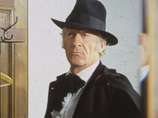 |
| The Newly Regenerated Doctor |
|
 Six months after witnessing the forced regeneration of the Second Doctor (and so the departure of Patrick Troughton) Doctor Who returned to our television screens to herald a brand new year and a brand new decade. 1970 marked the beginning of a new era for the show. Six months after witnessing the forced regeneration of the Second Doctor (and so the departure of Patrick Troughton) Doctor Who returned to our television screens to herald a brand new year and a brand new decade. 1970 marked the beginning of a new era for the show.
 It is very apparent from the first few seconds of the opening episode of "Spearhead From Space" that Doctor Who had changed. Gone were the moody black and white swirls. They had been replaced with new and vibrantly coloured patterns of glowing diamonds. Jon Pertwee’s face as the new Doctor then appears and then vanishes. The patterns then twist and spin in time with the hypnotic music. If you were lucky enough to have watched this story when it was first transmitted then you would have just witnessed the brand new opening titles for a brand new story, in a brand new season, for a brand new Doctor in a brand new era. And in colour for the very first time - if you had the money or the ability to watch the show on a colour television. It is very apparent from the first few seconds of the opening episode of "Spearhead From Space" that Doctor Who had changed. Gone were the moody black and white swirls. They had been replaced with new and vibrantly coloured patterns of glowing diamonds. Jon Pertwee’s face as the new Doctor then appears and then vanishes. The patterns then twist and spin in time with the hypnotic music. If you were lucky enough to have watched this story when it was first transmitted then you would have just witnessed the brand new opening titles for a brand new story, in a brand new season, for a brand new Doctor in a brand new era. And in colour for the very first time - if you had the money or the ability to watch the show on a colour television.
 As the season progressed it also became clear that gone were the predominately outer space and futuristic stories - being exiled to Earth by his own race, the Time Lords, The Doctor is well and truly Earthbound. Gone was the slapstick; and gone was the monochrome simplicity of the Sixties. From the moment the seventh season began, it was clear this was the dawn of a new age for the show. After the revamped title sequence we were presented with a panoramic shot of space that ended upon the Earth. It was a symbol that the series had evolved into something new and exciting. As the season progressed it also became clear that gone were the predominately outer space and futuristic stories - being exiled to Earth by his own race, the Time Lords, The Doctor is well and truly Earthbound. Gone was the slapstick; and gone was the monochrome simplicity of the Sixties. From the moment the seventh season began, it was clear this was the dawn of a new age for the show. After the revamped title sequence we were presented with a panoramic shot of space that ended upon the Earth. It was a symbol that the series had evolved into something new and exciting.
 Like the change from the First Doctor to the Second Doctor the viewer had a similar storyline to introduce Jon Pertwee as the new Doctor. Whereas the Second Doctor had Polly Wright and Ben Jackson to ease the transformation between regenerations and, so provide continuity for the viewers, The Third Doctor had The Brigadier - who had appeared twice before during the Second Doctor’s era. Like with "The Power of the Daleks", Patrick Troughton’s debut story, it takes time for The Brigadier to be convinced that the stranger before him is The Doctor. However, once convinced it is clear that The Brigadier is more than happy to have The Doctor around - even though at first The Doctor is far from happy about being stuck on Earth. The debut story also introduces Liz Shaw, as The Doctor’s assistant. The first of three, not including the UNIT regulars, that The Doctor would have during his third incarnation. Like the change from the First Doctor to the Second Doctor the viewer had a similar storyline to introduce Jon Pertwee as the new Doctor. Whereas the Second Doctor had Polly Wright and Ben Jackson to ease the transformation between regenerations and, so provide continuity for the viewers, The Third Doctor had The Brigadier - who had appeared twice before during the Second Doctor’s era. Like with "The Power of the Daleks", Patrick Troughton’s debut story, it takes time for The Brigadier to be convinced that the stranger before him is The Doctor. However, once convinced it is clear that The Brigadier is more than happy to have The Doctor around - even though at first The Doctor is far from happy about being stuck on Earth. The debut story also introduces Liz Shaw, as The Doctor’s assistant. The first of three, not including the UNIT regulars, that The Doctor would have during his third incarnation.
 Despite this season only containing four stories - half the amount of the average for the previous six seasons – and being only 25 weeks long (whereas the average length of a season for the First Doctor was 42 weeks and the Second Doctor was 43 weeks) the viewing figures remained at a respectable average for the whole show up until that point in its history. Despite this season only containing four stories - half the amount of the average for the previous six seasons – and being only 25 weeks long (whereas the average length of a season for the First Doctor was 42 weeks and the Second Doctor was 43 weeks) the viewing figures remained at a respectable average for the whole show up until that point in its history.
 Despite being shorter this season was action packed and fast paced. As well introducing two new popular alien species to the show - the Autons and the Silurians - it ended with a story that is considered by many fans to be the best of the Third Doctor’s era - "Inferno" - which introduced the concept of a parallel universes. Despite being shorter this season was action packed and fast paced. As well introducing two new popular alien species to the show - the Autons and the Silurians - it ended with a story that is considered by many fans to be the best of the Third Doctor’s era - "Inferno" - which introduced the concept of a parallel universes.
 As to behind the cameras - after producing the first story of the season Derrick Sherwin decided to leave the show. His replacement was Barry Letts, who had previously directed the Second Doctor story "The Enemy of the World". Together, he and Script Editor, Terrance Dicks, became one of the most stable production teams in Doctor Who's history, remaining intact throughout the rest of the Third Doctor’s era. In fact Barry Letts involvement in the show can be classed in the same league as that of the very first producer, Verity Lambert, the long stint of John Nathan-Turner and with Russell T Davies - the man responsible for the shows success when the show returned to our screens in 2005. Barry Letts and Terrance Dicks’ contribution to Doctor Who was to become enormous. As to behind the cameras - after producing the first story of the season Derrick Sherwin decided to leave the show. His replacement was Barry Letts, who had previously directed the Second Doctor story "The Enemy of the World". Together, he and Script Editor, Terrance Dicks, became one of the most stable production teams in Doctor Who's history, remaining intact throughout the rest of the Third Doctor’s era. In fact Barry Letts involvement in the show can be classed in the same league as that of the very first producer, Verity Lambert, the long stint of John Nathan-Turner and with Russell T Davies - the man responsible for the shows success when the show returned to our screens in 2005. Barry Letts and Terrance Dicks’ contribution to Doctor Who was to become enormous.
 However, at the time despite all the behind-the-scenes changes and the fact that the audience was roughly twice that of the final Troughton story, "The War Games", it still remained to be seen whether audiences would accept the more Earthbound stories and that the lead character had changed for a second time. Jon Pertwee may have brought a more heroic, otherworldly version of James Bond to the show but would fans accept his very different portrayal of The Doctor to that which William Hartnell and Patrick Troughton had previously brought to the show? However, at the time despite all the behind-the-scenes changes and the fact that the audience was roughly twice that of the final Troughton story, "The War Games", it still remained to be seen whether audiences would accept the more Earthbound stories and that the lead character had changed for a second time. Jon Pertwee may have brought a more heroic, otherworldly version of James Bond to the show but would fans accept his very different portrayal of The Doctor to that which William Hartnell and Patrick Troughton had previously brought to the show?
 Sadly, while compiling this article, it was announced that Barry Letts had passed away. Therefore the Whotopia articles for this season, and the three stories he was involved with during Season Seven, are dedicated to his memory. Sadly, while compiling this article, it was announced that Barry Letts had passed away. Therefore the Whotopia articles for this season, and the three stories he was involved with during Season Seven, are dedicated to his memory.
|
|
|
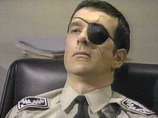 |
| Brigade Leader Lethbridge Stewart |
|
 What must be classed as the classic scene of all time in the show is when shop dummies suddenly come to life and burst onto the street from department store windows and start firing at passes by in what was a few minutes earlier a peaceful looking shopping area. Of course these mannequins are Autons and in their debut story "Spearhead From Space" they proved to be an alien force that even The Doctor found to be very hard to defeat. What must be classed as the classic scene of all time in the show is when shop dummies suddenly come to life and burst onto the street from department store windows and start firing at passes by in what was a few minutes earlier a peaceful looking shopping area. Of course these mannequins are Autons and in their debut story "Spearhead From Space" they proved to be an alien force that even The Doctor found to be very hard to defeat.
 This season’s final story, "Inferno", despite having the lowest viewing figures for this season, has been classed, by many fans, to be the best of the Third Doctor’s era. This story contains the very first visit to a parallel universe where things are similar to our own - but not quite. It has been reported that Caroline John, who played Liz Shaw, much preferred to play the ‘baddie’ version of her character than the good version. And who can forget the look on The Doctor’s face when he comes face-to-face with Brigade Leader Lethbridge-Stewart - wearing an eye patch - and realising that this version is far from being his friend. This season’s final story, "Inferno", despite having the lowest viewing figures for this season, has been classed, by many fans, to be the best of the Third Doctor’s era. This story contains the very first visit to a parallel universe where things are similar to our own - but not quite. It has been reported that Caroline John, who played Liz Shaw, much preferred to play the ‘baddie’ version of her character than the good version. And who can forget the look on The Doctor’s face when he comes face-to-face with Brigade Leader Lethbridge-Stewart - wearing an eye patch - and realising that this version is far from being his friend.
 It is though in the final minutes of this story that a wonderful scene between The Doctor and The Brigadier takes place. After calling The Brigadier a ‘Pompous, self-opinionated idiot’ The Doctor, convinced he has finally fixed his TARDIS, dematerialises away - only then to walk through the doorway apologising profusely. ‘Yes, well, we don't want to bear a grudge for a few hasty words, do we? No, not after all the years that we've worked together. Now, come along, my dear fellow. Put on a smile...’ It seems the TARDIS console has landed just outside and The Doctor needs the assistance of UNIT to retrieve it from the top of a rubbish dump! It is though in the final minutes of this story that a wonderful scene between The Doctor and The Brigadier takes place. After calling The Brigadier a ‘Pompous, self-opinionated idiot’ The Doctor, convinced he has finally fixed his TARDIS, dematerialises away - only then to walk through the doorway apologising profusely. ‘Yes, well, we don't want to bear a grudge for a few hasty words, do we? No, not after all the years that we've worked together. Now, come along, my dear fellow. Put on a smile...’ It seems the TARDIS console has landed just outside and The Doctor needs the assistance of UNIT to retrieve it from the top of a rubbish dump!
|
|
|
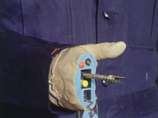 |
| An Auton's Hand Weapon |
|
 The highest point of this season must go to the first story "Spearhead From Space" for two reasons. Firstly for the introduction of a story, for the very first time, in colour. From the opening titles, which includes Jon Pertwee’s face to the zooming in from outer space to planet Earth sets the look and feel of the show perfectly for the seventies. This introduction was also replicated for "Rose" the opening story of the shows revival in 2005. Interestingly this latter story also heralds the return of the Autons who made their debut in "Spearhead From Space". And it is for their appearance in this story that is the second reason for making this story the high point of this season. The highest point of this season must go to the first story "Spearhead From Space" for two reasons. Firstly for the introduction of a story, for the very first time, in colour. From the opening titles, which includes Jon Pertwee’s face to the zooming in from outer space to planet Earth sets the look and feel of the show perfectly for the seventies. This introduction was also replicated for "Rose" the opening story of the shows revival in 2005. Interestingly this latter story also heralds the return of the Autons who made their debut in "Spearhead From Space". And it is for their appearance in this story that is the second reason for making this story the high point of this season.
 With the scenes of the Autons with their slightly clumsy walk thrashing their way through the undergrowth in the woods, and their frantic searching in the poacher’s cottage, for the final piece of the Nestene Conscious, makes these plastic mannequins a truly scary creature. But the best (or should that be worst) is still to come. Who can forget the scene where the hand of an Auton hinges down at its wrist to reveal a very menacing looking gun. The Autons made a huge impact at the time - so much so they would make a return in the opening story of the very next season making an even scarier use of plastic. With the scenes of the Autons with their slightly clumsy walk thrashing their way through the undergrowth in the woods, and their frantic searching in the poacher’s cottage, for the final piece of the Nestene Conscious, makes these plastic mannequins a truly scary creature. But the best (or should that be worst) is still to come. Who can forget the scene where the hand of an Auton hinges down at its wrist to reveal a very menacing looking gun. The Autons made a huge impact at the time - so much so they would make a return in the opening story of the very next season making an even scarier use of plastic.
 With only four stories to choose from the lowest point for this season is not easy to identify. The third story "The Ambassadors of Death" is considered by fans to be the worst story of Season Seven - even though the viewing figures at the time do not back this up. During this story we have Liz Shaw being incarcerated for most of the time, The Doctor nearly assassinated and astronauts being kidnapped despite UNIT being in charge of security. However, it is the reason for the villain of the piece, General Carrington, wanting to discredit the alien ambassadors that lets this story down - big time. All because of his need for revenge for the accidental death of a crewmember of an earlier space flight. With only four stories to choose from the lowest point for this season is not easy to identify. The third story "The Ambassadors of Death" is considered by fans to be the worst story of Season Seven - even though the viewing figures at the time do not back this up. During this story we have Liz Shaw being incarcerated for most of the time, The Doctor nearly assassinated and astronauts being kidnapped despite UNIT being in charge of security. However, it is the reason for the villain of the piece, General Carrington, wanting to discredit the alien ambassadors that lets this story down - big time. All because of his need for revenge for the accidental death of a crewmember of an earlier space flight.
|
|
|
|
|
| |
The Lasts (Subject to Future Stories):
| |
| Doctor Who CMS Magazine (An Adventure in Space and Time) | Season Seven Special | | Doctor Who Magazine - Episode Guide | Issue 145 - (Released: February 1989) | | Doctor Who Magazine - Article | Issue 286 - (Released: January 2000) | | Doctor Who Magazine - Countdown to 50 | Issue 436 - (Released: July 2011) |
|
|
| |
The Doctor and Companions| | 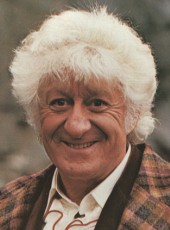 | | The Third Doctor |
|
| | | | |
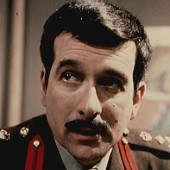 | | The Brigadier |
| 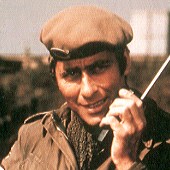 | | Sergeant Benton |
| 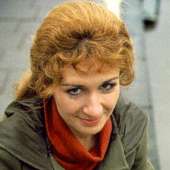 | | Liz Shaw |
| | | | |
|
On Release| | 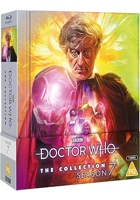 | | The Collection Season 7 Limited Edition Blu-Ray Cover |

VIDEO |
| | | | | |
Magazines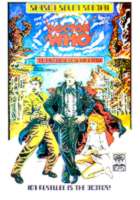 | | Doctor Who CMS Magazine (An Adventure in Space and Time): Season Seven Special |
| 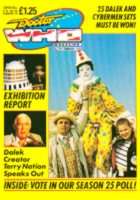 | | Doctor Who Magazine - Episode Guide: Issue 145 |
| 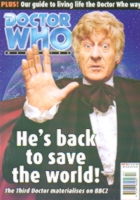 | | Doctor Who Magazine - Article: Issue 286 |
| 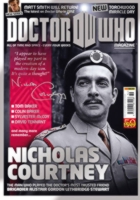 | | Doctor Who Magazine - Countdown to 50: Issue 436 |
| | | | |
|
|
|
| |
| |
|
| |
| |
|
| Doctor Who is the copyright of the British Broadcasting
Corporation. No infringements intended. This site is not endorsed by the BBC or
any representatives thereof. |
|